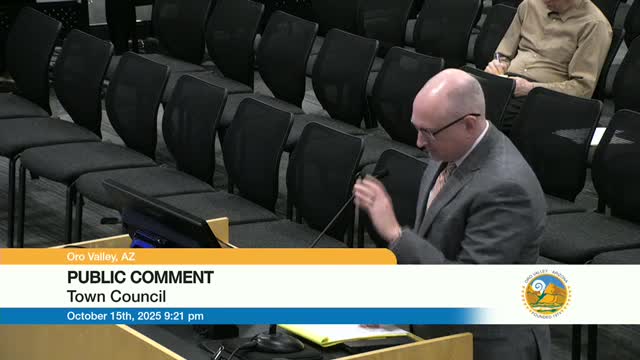Oro Valley studies commercial rental, telecommunications and use taxes amid budget pressures; staff to refine legal notice and outreach
Get AI-powered insights, summaries, and transcripts
Subscribe
Summary
Oro Valley officials continued a study-session debate Oct. 15 over proposed municipal taxes—a commercial rental tax, a telecommunications tax and a municipal use tax—directing staff to clarify legal notification requirements with ADOR and return with refined impact modeling and outreach.
Town staff returned to a study session Oct. 15 to continue discussion of three proposed municipal tax changes put forward to diversify Oro Valley’s revenues: a commercial rental tax, a telecommunications tax and a municipal use tax.
Assistant Town Manager/Finance Director Jeff Gephardt summarized the staff position: the town faces long-term structural pressures (flat construction sales tax, declining state shared revenues, rising operating/capital costs) and needs diversified revenue to preserve bond ratings and service levels. Gephardt said staff is working with Arizona Department of Revenue (ADOR) and the League of Arizona Cities and Towns to confirm legal noticing requirements and signaled staff would pause before final notices until those procedural questions were resolved. He asked council whether it wanted phased or immediate implementation and whether any additional information would be required before staff moved to formal business notices.
Several business representatives spoke during public comment. Kristen Sharp, president and CEO of the Oro Valley Chamber of Commerce and an Oro Valley resident, urged the council not to adopt a commercial rental tax, arguing landlords would pass costs to tenants and the levy would make Oro Valley less competitive with nearby jurisdictions. Commercial real-estate broker Robert (Rob) Tomlinson presented market data showing local retail vacancy and negative net absorption in the last 12 months, and urged caution on new business taxes that could deter retailers. Joyce Garland, who identified herself as a former municipal CFO and a member of the Budget & Finance Commission, urged the town to diversify revenues and warned that state shared revenue allocations decline when population growth lags.
Council members asked for additional detail. Several members said they favor a municipal use tax and telecommunications tax as comparatively less controversial; commercial rental tax drew the strongest opposition from attendees and some councilors. Councilmembers discussed phasing: one proposal would implement a lower initial commercial rental rate (for example, 1%) and raise it in later years if needed. Council and staff also discussed the need to model impacts on small businesses with tight margins and to examine local vacancy and landlord market power (some councilors cited recent market data showing Oro Valley’s retail vacancy above regional averages).
Gephardt said staff will continue outreach to businesses, coordinate with ADOR on proper statutory notice and timing, evaluate phased implementation options and return to council with more refined revenue and impact modeling and a recommended noticing schedule. No ordinance or tax adoption occurred; the item remains at study stage pending staff follow-up and legal clarification.
